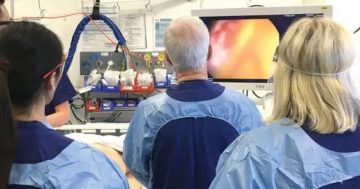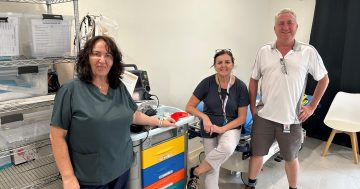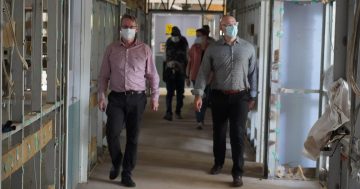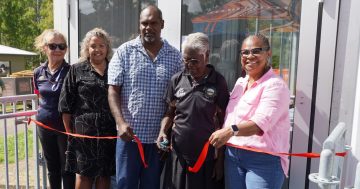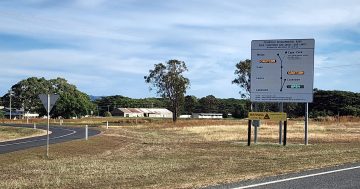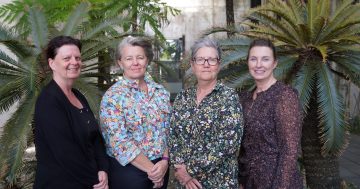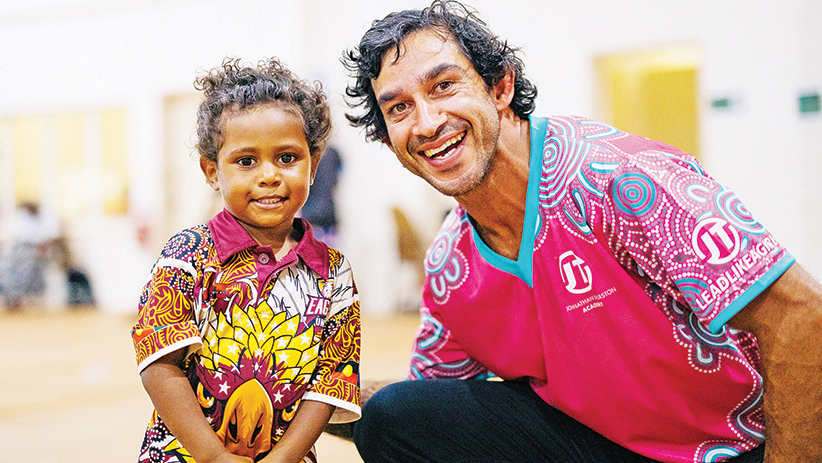
Johnathan Thurston and Umagico resident Cenia.
TORRES and Cape Hospital and Health Service facilities are prepared to manage outbreaks of COVID-19 that may occur in the region once Queensland borders reopen from December 17.
“We have been very lucky to date, with no local cases of COVID-19 reported in our region,” said TCHHS CEO Bev Hamerton.
“But there’s no doubt that once our borders reopen, COVID-19 will come to Queensland and more than likely there will be cases in our region.
“Our health service is well prepared to manage outbreaks as they occur, including the transfer of confirmed cases outside our region to larger tertiary hospitals with the specialised facilities necessary to manage them.
“As case numbers rise, it is likely that those patients who are less sick will need to be managed locally to reduce the pressure on our large specialised hospitals and we have options available for doing this, including, for those who can safely do so, care at home with the support of remote monitoring.
“We have done our best to prepare our health service for whatever comes our way, but we also need our communities to help by stepping up and doing their bit by getting fully vaccinated.
“Being fully vaccinated offers the highest level of protection, both against being infected and in helping minimise the seriousness of any illness if you do become infected.
“Having the vaccine is your choice. It’s safe, free and remains the best way to protect yourself, your family, and our communities from serious illness.
“With some individual community exceptions, vaccination rates in our region are nowhere near as high as we would like them to be.
“You have only to look at the Northern Territory and the NSW town of Moree to see how quickly COVID-19 can spread within vulnerable Aboriginal and Torres Strait Islander communities.
“COVID is coming and vaccination is the best defence we have, so please come forward and get vaccinated as soon as possible.”
Ms Hamerton said that since the first week in September, the health service had added 116 vaccination clinics to its comprehensive schedule, representing a total of 270 additional clinic days.
“We currently have 10 separate vaccination teams working across our region,” she said.
“Every community in Cape York and the Torres Strait is being offered multiple opportunities to be vaccinated, so there is no excuse for not doing so.’’
Last week, the Torres and Cape Hospital and Health Service offered clinics at Hammond, Poruma, Moa, Horn, Badu and Thursday islands, along with Weipa, Cooktown, Bamaga, Hope Vale, Aurukun and Napranum.
“Our partner, the Royal Flying Doctor Service, also offered vaccinations during their weekly visiting medical clinics at Lockhart River, Pormpuraaw and Kowanyama,” the CEO said.
“This week, the health service will be hosting clinics at Aurukun, Kowanyama, Wujal Wujal and Laura, along with Mabuiag, Mer, Iama and Warraber islands, while the RFDS will be offering vaccinations at Pormpuraaw and Lockhart River.
“There’s not a one-size-fits-all solution to increasing vaccination uptake in Cape York and we’re taking a multi-pronged approach by all groups in the community to target and tailor the best options for local people.”
To date in the Torres Strait, 77 per cent of the eligible population aged 12 years and over has received a first dose of vaccine through the health service and 62 per cent of people are fully vaccinated with both doses.
Cape York has 65 per cent of the total estimated eligible population aged 12 years and over who have received their first dose of vaccine through the TCHHS vaccination program alone, with 53 per cent now fully vaccinated.
In the NPA, 60 per cent of the eligible population so far has received the first dose, with 40 per cent fully vaccinated.
Across the TCHHS as a whole, about 55 per cent of the eligible population is now fully vaccinated.


